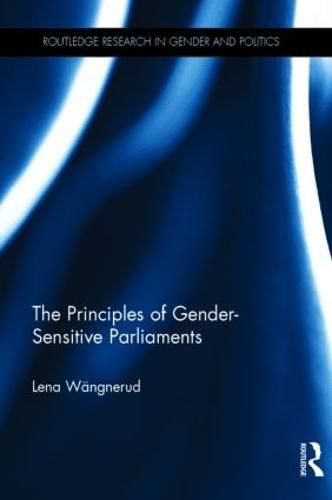Readings Newsletter
Become a Readings Member to make your shopping experience even easier.
Sign in or sign up for free!
You’re not far away from qualifying for FREE standard shipping within Australia
You’ve qualified for FREE standard shipping within Australia
The cart is loading…






Gender serves as a lens that makes visible important issues in the field of representation: Whom do elected politicians represent? What is at stake in the parliamentary process? What do we know about the interplay between parliaments and the everyday lives of citizens? It is widely understood that women’s presence in government matters but we need to understand the conditions under which it matters more clearly.
Using Sweden as a case study, a country where the number of women elected to the national parliament has steadily risen since the 1970s, Lena Wangnerud presents a novel approach on which characteristics inside a parliament help translate physical representation into substantive representation for women. Using three guiding principles: (i) the implementation of equal opportunities for women and men to influence internal parliamentary working procedures; (ii) the creation of room for women’s interests and concerns on the political agenda; and (iii) the production of gender-sensitive legislation, Wangnerud shows what are the necessary conditions for women’s needs, interests, and concerns to be adequately integrated into parliamentary processes.
The Principles of Gender-Sensitive Parliaments book adds fuel to all these classical debates within the field of political representation and will bring attention to a wider audience on why electing women matters.
$9.00 standard shipping within Australia
FREE standard shipping within Australia for orders over $100.00
Express & International shipping calculated at checkout
Stock availability can be subject to change without notice. We recommend calling the shop or contacting our online team to check availability of low stock items. Please see our Shopping Online page for more details.
Gender serves as a lens that makes visible important issues in the field of representation: Whom do elected politicians represent? What is at stake in the parliamentary process? What do we know about the interplay between parliaments and the everyday lives of citizens? It is widely understood that women’s presence in government matters but we need to understand the conditions under which it matters more clearly.
Using Sweden as a case study, a country where the number of women elected to the national parliament has steadily risen since the 1970s, Lena Wangnerud presents a novel approach on which characteristics inside a parliament help translate physical representation into substantive representation for women. Using three guiding principles: (i) the implementation of equal opportunities for women and men to influence internal parliamentary working procedures; (ii) the creation of room for women’s interests and concerns on the political agenda; and (iii) the production of gender-sensitive legislation, Wangnerud shows what are the necessary conditions for women’s needs, interests, and concerns to be adequately integrated into parliamentary processes.
The Principles of Gender-Sensitive Parliaments book adds fuel to all these classical debates within the field of political representation and will bring attention to a wider audience on why electing women matters.